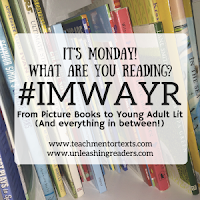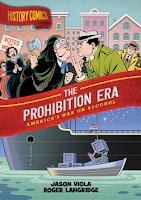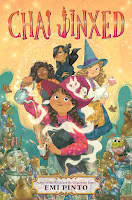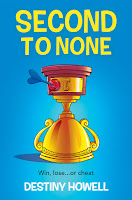

It'sMarvelous Middle Grade Monday
at
and #IMWAYR day
at
Meeker, Audrey and Davidson, Sarah.
SwingOctober 22, 2024 by Feiwel & Friends
E ARC provided by Netgalley
School projects can make for strange companions, and in this graphic novel Marcus, a reluctant soccer player, and Izzy, an aspiring fashion designer, are thrown together in a dance project for physical education class. Starting 8th grade is hard for Marcus, who is not as interested in soccer as his older brother is, especially since his former best friend and teammate, Ted, is a jerk. Ted, who also has an older brother, demands that Marcus show up for soccer practice so that the two can beat their brothers' team record, but Marcus wants to distance himself both from the sport and from Ted. Izzy, who often rocks a quirky quasi-Goth style, is on the recieving end of lots of negative comments from classmates, and is also under a lot of pressure from her mother to get good grades. Marcus and Izzy have to do a swing dance for class, which leads Ted to make fun of them, especially when they also end up sitting together in advanced language arts class... for the whole year! Marcus does go to team tryouts but is increasingly bothered by Ted's actions, even though he isn't brave enough to stand up to him. Izzy, meanwhile, finds a welcoming place in the theater group, where Ramona is excited to have her on board for talent show planning and costumes. Marcus and Izzy practice, and do a decent job, although Marcus has trouble leading. When the two do their dance for a grade, Marcus is distracted by Ted's comments, and it ends in disaster. Mr. Walsh, their gym teacher (and retired dancer!) says that their poor grade is enough that they might have to retake the class... unless they do a swing dance for the talent show. Izzy is NOT going to have her grades affected so that her mother has an excuse to pull her out of theater, so the two work on their dance. They actually enjoy being together, and may even have a little crush on each other, if we believe the many flushed cheeks in the pictures. They even hang out, eating popsicles on the driveway, and talk about the pressures they face at school. Of course, Ted isn't happy with Marcus' relationship, especially when he gets put on the silver team instead of the gold one, ruining their chances of beating their brothers. He even spies on the two and posts negative pictures of them on social media. Marcus finds out, and tells Ted that it's not like he's REALLY friends with Izzy--imagine the sorts of things tweens would say to try to save face. Of course, Izzy overhears and asks Mr. Walsh if she can dance solo in the show. Since Izzy's mother had to get the principal involved when Ted bullied Izzy in 7th grade, this is allowed, and Marcus ends up cleaning gym equipment. When Ted is mean about how Marcus plays during a big game, Marcus has had enough, and goes to Izzy's house with a box of soccer treat popsicles to apologize and ask to be able to dance with her. Izzy agrees, as long as Marcus will wear whatever costume she suggests. Marcus ends up in a silly shirt and pants, which rip as they are getting on the stage. Throwing caution to the wind, he dons a skirt, and the two do a great dance. They win second place, Izzy's mom apologizes for trying to deny Izzy the opportunity to do theater, and both Marcus and Ted have heart-to-hearts with their brothers.
Strengths: This is middle school bullying. It's calling people "clown show" when they're at their locker and teachers can't hear. It's Ted giving Marcus a hard time about not playing soccer and hanging out with Izzy. It's a thousand tiny paper cuts of social pressure and judgement. The sibling rivalry is also very true; I have to admit to motivating cross country runners to best their older sibling's time by reminding them that they would have bragging rights at Thanksgiving forever! Marcus' desire to drop out of soccer but he inability to do so is quite common, and it was good to see that Izzy did find a place where she was happy. The constant embarassment and discomfort pretty much defines middle school for many people. It's good to see a happy ending and emotional growth, because that gives readers struggling with their own issues hope that there may be a happy ending for them as well.
Weaknesses: This is not how grades work. Had Mr. Walsh failed the two, Izzy's mom would have thrown a fit with the principal and gotten Mr. Walsh in trouble. It's much more likely that Mr. Walsh would have taken pity on them and let them redo the dance at lunch, and one project is rarely enough to torpedo grades in any classes in today's academic climate. Pretty sure that if Marcus and Izzy showed up for class every day and tried, they would have gotten at least a B. The skirt seemed over the top to me, but since I have a lot of boys who wear eyeliner and nail polish, I don't think today's tweens will think it's as scandalous as Ted seems to.
What I really think: Definitely purchasing, and this will be a popular title with fans of books with plenty of friend drama. Looking forward to seeing more titles from this author.
Thank you, Lenny D. , for being so nice during 6th grade square dancing. Not sure how well we did, since you were a full foot taller than I was, but I got a B in gym class, and there was never any drama. Dancing of any kind in gym class is a deep, deep trauma for many of us, isn't it?
Lonely Planet Kids.
Your Ultimate Travel Adventure GuideOctober 22, 2024 by Lonely Planet
E ARC provided by Edelweiss Plus
"If you could jump on a plane tomorrow and go anywhere in the world, where would you choose?" What a great way to get kids engaged in learning more about the world and planning future adventures. When I was twelve, I swore that by the time I turned 40, I would get to England, and that's where I spent my 40th birthday, even with the subway bombing happening days before I was set to leave. This book describes the best adventures and most intriguing places on different continents, and gives kids good tips on how to find their idea of a perfect trip.
There are a wide range of experiences for all tastes; outdoor scenery, theme parks, notable cities, science related sites, and cultural touchstones and celebrations. This does focus largely on natural wonders of the world, which makes sense; not everyone gets as excited about book related venues like Louisa May Alcott's
Orchard House as I do.
Each brightly colored spread gives a short description of the location and its significance, some statistics when applicable, different things to do and see, and additional information. The pictures are fantastic, and give great glimpses of landscapes, animals, and events to look forward to. This starts with a helpful table of contents and does have a good index at the end.
This is a perfect book to have in the car as you make an interminable fifteen hour drive to visit grandparents in Iowa. You can have the kids describe the different places you are not going (the underwater scultpure park in Grenada, the Grand Canyon, the Kangaroo Islands ), and then tell them that if they want to go to these really cool places, they need to start building their travel skills and stamina by visiting the World's Largest Truck Stop on I-80 and the
Grotto of the Redemption in West Bend. And if they're really good, you'll take them to the capitol building in Des Moines and sing the Schoolhouse Rock song about the preamble to the Constitution with them very, very quietly. It you're a better parent than I am, you can actually TAKE your children to some of the cool places in this book. For even more outdoor sites to see, I highly recommend Lonely Planet Kids'
America's National Parks books as well.











.jpg)



.jpg)































